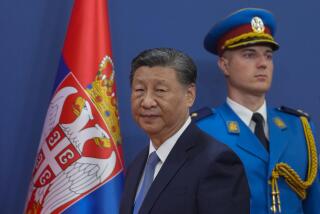Chinese Find Gorbachev’s ‘New Thinking’ Dismaying
- Share via
BEIJING — Seven months after Chinese leader Deng Xiaoping told Soviet President Mikhail S. Gorbachev that their decades-old ideological schism had been healed, Chinese leaders are privately accusing Gorbachev’s reforms of leading the socialist world astray.
Chinese authorities, in internal documents and closed meetings, reportedly blame Gorbachev and his “new thinking” diplomacy for unleashing the forces that have ended 40 years of Communist dominance in East Europe.
Diplomatic sources say China was being careful to avoid a public break with the Soviet Union and other fast-changing socialist states by stressing that China never interferes in the internal affairs of other nations.
The sources say open disapproval of the upheavals in East Europe would show the Chinese people how isolated their hard-line leaders have become from the popular reforms sweeping the socialist world.
The authorities have taken a different tack, drumming home in recent days the inevitability of Communist rule in China and the correctness of their harsh suppression of political opposition.
Privately, however, Deng and other leaders feel betrayed by the revolutionary events set off by Gorbachev and are deeply concerned that democratic unrest may spread to China, the sources say.
This concern was heightened by the violent overthrow of the Nicolae Ceausescu government in Romania. Ceausescu, an old friend of China, tried and failed to use the Chinese method of silencing dissent with armed force.
After Ceausescu’s downfall, several illegal anti-government posters have appeared on Beijing campuses, among the first small signs of resistance since the military crackdown of the student-led movement in June.
One internal document circulating among high officials that lays down the official position on Romania reportedly cites Gorbachev’s policies as one factor behind the turmoil in Romania. It also speaks of the subversion of hostile foreign forces, a reference to the West.
Senior party leaders have also criticized Gorbachev in meetings convened over the last few weeks to discuss East Europe, sources say.
In May, Gorbachev traveled to Beijing for the first Chinese-Soviet summit in 30 years. He said the normalization of bilateral relations, confirmed in his meeting with Deng, was of “epoch-making significance.”
It has produced more Chinese-Soviet trade and increased the pace of talks on the future of the disputed Sino-Soviet border. Premier Li Peng is still expected to return Gorbachev’s visit next spring.
But the democratic reforms in Eastern Europe have revived old suspicions and ruled out the possibility for ideological brotherhood.
A visit to China recently by Valentin Falin, head of the Soviet Communist Party’s International Department and the highest party official to visit China since May, went unnoticed in the official Chinese press until he met on his final day with party General Secretary Jiang Zemin.
Reports on that meeting had Jiang lecturing Falin that socialist reform must “take the right route.” The Soviet side had no comment on the talks, and Falin declined even to talk to the Soviet press.
Foreign Ministry spokesman Jin Guihua, asked about Gorbachev’s “new thinking” diplomacy that encourages socialist countries to choose their own paths to political reform, said the concept “requires careful and serious study.”
But a Soviet source said it was “very clear the Chinese are now critical” of the idea. Sources say senior Chinese leaders are criticizing Gorbachev for “confusing people” about socialism.
Analysts point out that the situation now is far different from the 1960s, when Mao Tse-tung accused Moscow of revisionism and the two countries split over ideological differences and leadership of the Communist world.
China’s doctrinaire hard-liners still believe, as Jiang said in a recent speech, that China “should occupy the ideological front with Marxism.”
But with the Communist world in disarray, vying with the Soviet Union for ideological leadership is no longer a real prospect.
Instead, China’s leaders are trying to survive by staying above the fray. The future of socialism is bright, the Chinese are being told to believe, but only if China goes its own way.
More to Read
Sign up for Essential California
The most important California stories and recommendations in your inbox every morning.
You may occasionally receive promotional content from the Los Angeles Times.













